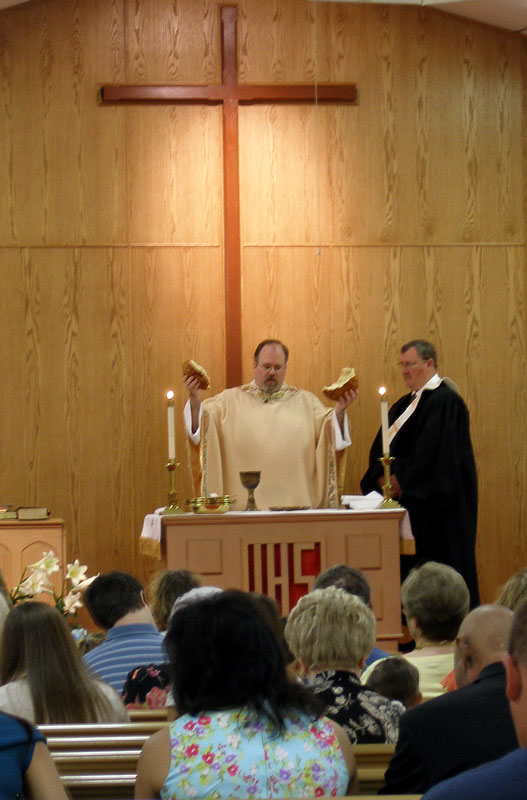How can we tell whether a particular Christian is likely to feel more comfortable in a mainline Protestant church than in an evangelical congregation?
The finding last month by the Public Religion Research Institute’s (PRRI) 2020 Census of American Religion that white mainline Protestants now outnumber white evangelicals in the United States generated a spate of headlines about the new appeal of mainline Protestantism for a younger, more progressive crowd of white Christians who have become fed up with the culture war politics of contemporary American evangelicalism.

(Dr. Gregory S. Neal presiding over the Eucharist at a UMC service, 2006)
I have my doubts about this survey’s findings. As Chris Gehrz pointed out in a highly insightful blog post that I would encourage anyone interested in this topic to read, the flawed methodology of the PRRI survey unfortunately makes it impossible to determine very much about the contemporary state of white mainline Protestantism vis-à-vis evangelicalism, because the PRRI survey did not define mainline Protestantism in the way that most surveys have. Surveys that sort respondents by denominational affiliation have consistently shown steep declines for nearly all mainline Protestant denominations – sometimes declines of up to 40 percent over a 10-year period, as was the case for the PCUSA.
Instead of asking about denominational affiliation – and categorizing people as mainline Protestants if they were members of denominations that fit that label – or even asking people whether they considered themselves “mainline Protestant,” the PRRI survey instead asked respondents who identified as Protestants whether they were “evangelical or born again.” If they answered negatively, the PRRI survey automatically categorized them as mainline Protestant.
By using the broadest possible definition of mainline Protestant – that is, any Protestant who does not identify as evangelical or born again – the PRRI researchers were perhaps operating from the assumption that there is a mainline Protestant ethos that might extend far beyond the declining denominations that have historically been considered mainline. While I find the PRRI research methodology highly problematic, I find this assumption intriguing.
If indeed it is the case (as I suspect) that a lot of American Protestants think like mainliners even if they don’t attend a mainline Protestant denomination, what exactly is the mainline Protestant ethos to which they subscribe? In other words, is there a particular attitude or viewpoint that might predict whether a person is leaning toward mainline Protestantism even if they haven’t yet joined a mainline Protestant church?
There are many ways in which we could answer this question, which is really about what constitutes the difference between evangelical ways of thinking and mainline Protestant approaches. We could talk about the differences in hermeneutical approaches to the Bible or attitudes to social questions. But I think that perhaps the most fundamental difference might be the question of salvation – that is, the question of who is saved and what exactly it means to be saved.
If one were devising a survey question to test for this difference, it might look something like this: Do you think that heaven or salvation is reserved for people who know Jesus as their Savior, or do you think that many non-Christian people can experience salvation, a relationship with God, or the promise of heaven without becoming Christians? There are other ways that the question could be worded, and perhaps someone with professional polling experience would be able to suggest alternative phrasing. Indeed, Lifeway Research (an evangelical polling and research firm) uses agreement with this version of the statement as one of four theological tenets that categorizes people as “evangelical by belief”: “Only those who trust in Jesus Christ alone as their Savior receive God’s free gift of eternal salvation.”

(Incidentally, when Lifeway Research surveyed for agreement with core theological doctrines of evangelicalism, they discovered that group of people who are consistently “evangelical by belief” is both smaller than the number who attend evangelical denominations and considerably more racially diverse. Black Protestants are overwhelmingly likely to be “evangelical by belief,” even when they do not identify with the evangelical label. On the other hand, many Southern Baptists in the pews don’t necessarily hold the theological beliefs that one would ordinarily expect from evangelicals. According to Lifeway Research, even though 25 percent of Americans are affiliated with an evangelical denomination, only 18 percent are “evangelical by belief” – but the 18 percent are not merely a subset of the 25 percent, but are instead a cross-section of the Protestant population that includes many Black Protestants and others who do not necessarily think of themselves as evangelicals.)
Perhaps Lifeway Research was, in its own way, getting at the definition of evangelical that PRRI was aiming at when it asked respondents whether they considered themselves “born again.” But Lifeway Research probably defined their terms in a more unmistakably evangelical manner than the more generic phrase “born again.” Forty-one percent of Americans now say they have been “born again” – a much higher percentage than can be explained by the evangelical population alone. Non-evangelicals may use the term “born again” to refer to a religious turning point, an intense religious experience, or a moment when their life changed and they began to experience God in a new and deeper way. But do they mean precisely what evangelicals commonly mean by the term – that is, the moment when they were saved? Not necessarily.
Evangelical Protestants, from the eighteenth century to the present, have used the term “born again” to mean the moment of personal salvation and regeneration, and they have emphasized an exclusivistic view of salvation that reserves salvation only for those who have had such an experience. Salvation comes only through Jesus, evangelicals have always said, and that divine gift of salvation is received through God’s gift of personal faith and Spirit-produced regeneration. While many evangelicals (including Billy Graham) have suggested that God might save some non-Christians who have never heard the gospel and therefore never been given the chance to believe, they have nevertheless continued to insist that salvation comes only through Christ and have said that one can expect to receive this promise only by putting one’s personal faith in Jesus as Savior. This exclusivist view of salvation puts them in line not only with the eighteenth-century evangelicals of Jonathan Edwards’s day but with the seventeenth-century Puritans who inspired them.
From the seventeenth century to the present, there have also been sizeable groups of Protestants on American shores who resisted this narrow view of salvation. In the seventeenth century, many Anglicans adopted a much broader view of salvation’s highway, and for the last century or more, mainline Protestants have done the same.
In the late nineteenth century, liberal Protestants began placing increasingly less emphasis on the individual conversion experience than early nineteenth-century revivalists had, and at the beginning of the twentieth century, some of them began to think that perhaps personal faith in Jesus was not required for salvation at all. Indeed, for some of them individual salvation was a less important priority than the realization of the kingdom of God at the social level – and this realization could come in some instances through the work of non-Christians, they thought. As early as the 1920s, some mainline Protestant missionaries began questioning the idea that non-Christians on foreign mission fields had to believe in Jesus to be saved. As early as the 1930s, they began partnering with Jews to fight anti-Semitism and promote the idea of a “Judeo-Christian” nation in which Catholics, Protestants, and Jews would be equal partners. And in the 1960s, they developed a strongly pluralistic social theology that emphasized shared moral goals among people of all religions. Many mainline Protestants embraced an explicitly universalistic theology – that is, the idea that all people will be saved, regardless of whether they trust in Christ during this life. Others did not go quite that far, but nevertheless believed that God’s saving grace was not confined to those who professed faith in Jesus.
Thus, a 2014 Pew Research survey showed that only 60 percent of mainline Protestants (and fewer than 50 percent of Episcopalians and UCC members) believe that hell exists, compared to more than 80 percent of evangelicals. And mainline Protestants who believe in the existence of hell often disagree with evangelical orthodoxy on who ends up – or doesn’t end up – there. Eighty-three percent of white mainline Protestants said in a 2008 Pew Research survey that “many religions can lead to eternal life,” and 62 percent said that eternal life would be given even to “people with no religious faith.” Only 12 percent said that “my religion is the one true faith leading to eternal life.”
With their pluralistic beliefs, mainline Protestants generally frown on proselytism. The 2008 Pew Research survey also showed that 57 percent of mainline Protestants seldom or never shared their faith, compared to only 29 percent of evangelicals. (Indeed, 34 percent of evangelicals said they shared their faith with others every week, while another 18 percent did so at least once a month).
This is not to say that all self-identified evangelicals agree with the exclusivistic views on who will be saved on salvation that are commonly presented in their churches; indeed, perhaps a slight majority of them do not, according to Pew Research surveys. (This perhaps provides further confirmation that self-identified evangelicals or people who are classified as evangelical because of their denominational affiliation are not necessarily “evangelical by belief.”) Nevertheless, this doctrine has historically been central to evangelicalism, and it still provides the theological subtext for most evangelical churches, including seeker-sensitive nondenominational community churches that try to welcome everyone.
Why is the difference between evangelical exclusive understandings of salvation and mainline Protestant pluralistic understandings the key to discerning the difference between the two traditions? For one, it provides the key to understanding their different interpretations of the Bible. Mainline Protestant theologians commonly read the Bible through the lens of equality and inclusivity; evangelical theologians, on the other hand, are much more likely to focus on passages that discuss individual salvation through faith or that determine the boundaries of theological orthodoxy in ways that reinforce evangelicals’ exclusivistic understanding of salvation.
For evangelical theologians, exclusivistic understandings of salvation are mandated by the Bible, but they also honor the holiness and sovereignty of God while taking into account the full magnitude of human sin. It is only God’s grace that saves, they believe. If a person rejects God’s grace (as Arminian evangelicals might phrase it) or if God sovereignly chooses not to extend mercy toward a person (as evangelicals in the Reformed tradition might say), that person cannot expect to be saved, since no one can earn salvation on their own merit or receive salvation through any other power than Jesus Christ. God is not obligated to save anyone, which means that no amount of good works or good disposition can ever save a person. That’s what sola gratia implies.
Mainline Protestants, while not disagreeing with evangelicals’ emphasis on the grace of God, tend to see God’s grace as emanating from God’s universal love, whereas many evangelical theologians tie it much more closely to Christ’s atoning work on the cross – a view that lends itself to the idea that salvation can be found only through faith in Christ. Mainline Protestant theologians commonly see the cross as a symbolic demonstration of God’s love, whereas evangelicals (especially, but not exclusively, those in the Reformed tradition) generally believe strongly in the idea of substitutionary atonement and insist that Christ’s death on the cross was necessary to satisfy the justice of God.
To those outside of either the evangelical or mainline Protestant traditions, all of this might seem like theological hair-splitting, especially when it gets into debates about the atonement. What really matters to many pollsters, I think, are questions about sexuality, partisan politics, and the latest hot-button political issues.
But what many may not realize is that these theological distinctions have direct implications for political stances. For decades, mainline Protestants’ pluralistic theology and emphasis on equality and the universal love of God have translated into political campaigns for equal rights and a more democratic society. Since at least the 1980s, a majority of mainline Protestant clergy have identified as Democrats, and liberals have far outnumbered conservatives. Whether the issue is LGBTQ rights, immigration policy, racial justice, tax policy, or the rights of Muslims and other religious minorities, mainline Protestant periodicals such as the Christian Century have consistently promoted the principles of pluralism and equality. And because they are thoroughly pluralistic in their understanding of salvation, they show more affinity for non-Christians who share their political views than for fellow Christians who do not, as Baylor University sociologist George Yancey and Ashlee Quosigk noted in their recent book One Faith No Longer.

But what about evangelicals? Here the connection between theology and politics is less clear-cut, because among Black Protestants (a group that overwhelmingly votes Democratic), beliefs in the existence of hell and commitments to sharing their Christian faith with others are just as strong as among white evangelicals (a group that overwhelmingly votes Republican). And yet it doesn’t take much imagination to see how exclusive views of salvation could easily translate into political policies against Muslim immigration or opposition to LGBTQ rights, even if they don’t do so invariably. Indeed, this is exactly what Christian nationalism does for some white evangelicals: It takes an exclusivistic theology of salvation only through Christ and then applies it not just to the individual but to the nation, saying that if America does not repent and regain its Christian identity at the political or national level, the nation will face God’s wrath.
Evangelicals who are fully committed both to democratic pluralism and to exclusivistic views of salvation have faced some difficult questions from journalists who wonder how the two ideas can coexist. But as Tim Keller (who, as a New York City pastor, works in a highly pluralistic environment) has explained, a view of salvation only through God’s sovereign grace should lead to greater humility, rather than partisan or nationalistic arrogance and exclusivity. After all, if salvation really is a gift of divine grace that is completely unmerited, it’s hardly something that we can arrogantly build a tribal identity around in the political sphere. Evangelicals who are committed to democratic equality in the political realm have commonly drawn on their theological tradition’s emphasis on the common humanity of all people, the common grace that God has extended to all humanity, and (for many evangelicals, at least) the universal offer of God’s grace to all people. An exclusivistic view of salvation does not have to lead to political conservatism or anti-egalitarian political stances. It can instead lead to campaigns for social justice in the political realm, combined with evangelistic witness to non-Christians in the hope that they, too, will experience the salvation that comes through faith in Christ.
Regardless of its political effects, though, an exclusivistic view of salvation does serve as a critical theological distinction between evangelicalism and mainline Protestantism. While one can find mainline Protestants who hold exclusivistic views of salvation and evangelicals who are very inclusivistic and pluralistic (and maybe even universalist), in general I think that those who hold strongly inclusivistic views will find evangelicalism an increasingly uncomfortable theological fit, while those who hold exclusivistic views will eventually decide to break with mainline Protestant churches if they have not already.
This distinction also offers a clue to an evangelical view of politics that George Yancey noted – and that I hope will gain wider attention. Because evangelicals believe that salvation is only through Christ, politically conservative evangelicals are more tolerant of fellow Christians who disagree with their politics than are politically liberal mainline Protestants. As much as politically conservative evangelicals might want to make support for the Republican Party an article of faith, in the end, if they think that a Democrat is a genuine Christian believer, they will feel a greater affinity for that person than a politically liberal mainline Protestant will feel toward a Republican Christian – or, at least, this was Yancey’s finding. To me, this makes sense. If an evangelical believes that fellow Christians are the only ones with whom they will spend eternity, they’ll develop a spiritual bond with them that transcends politics. But for a mainline Protestant who does not have that theology – and who instead holds human rights and equality as their highest value – it will be hard to imagine religious belief superseding values-based commitments as a bond of fellowship or friendship.
Yancey concluded that the differences between evangelicals and mainline Protestants were so great that they essentially constituted two different faiths. I don’t think that I would go that far. But I do think that the way the two groups understand salvation is very different, and that that difference goes a long way toward explaining all of the other contrasts (both theological and social or political) that we see between the two Protestant traditions.













